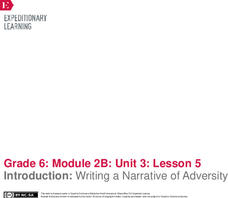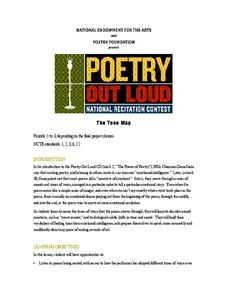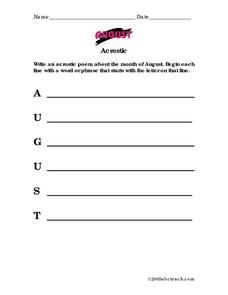K12 Reader
If
Rudyard Kipling's advice to his son in the poem "If" is a resounding message that echoes through generations. After reading the famous poem, middle schoolers work on analyzing specific lines, completing activities based on...
Curated OER
Poetry Gifts
What kind of shoe is this person? What time of day is this person? Aspiring poets’ responses to a list of questions provide descriptive words and phrases that can be crafted into a blank verse poem. A link to sample poems is provided.
Curated OER
Using Opening Lines as Writing Prompts
Help your writers get started with these hooks! Twenty-five opening lines from the "Lives" column in the New York Times Magazine act as prompts for creative writing. Have your learners choose one prompt and write an original essay....
Curated OER
Plot/Poetry Review
Before a writer can create a well-composed piece, he/she needs to know the ropes. Review parts of speech, plot, and elements of poetry with this set of questions presented as a PowerPoint. The text, being white, is kind of difficult to...
Bright Hub Education
Use Pictures or Artwork to Spark Creative Writing
Art in one form can inspire art in another. Use images to inspire writing in your English class. The instructional activity described here is not detailed; however, the idea is strong. An engaging way to get class members interested in...
Curated OER
Creative Writing
Students determine what grammar is and how they have learned it. In this creative writing lesson, students read "Style' Gets New Elements," and respond to the discussion questions. Students then present grammatical rules to one another...
Art Institute of Chicago
Lesson Plan: A Writer’s Odyssey
Looking for a fresh approach to an end-of-unit project for The Odyssey? Check out a resource that has class members write their own hero's journey short story and then craft an illustration that depicts their tale. Apollonio di...
Santa Ana Unified School District
Early American Poets
The poems of Walt Whitman and Emily Dickinson are the focus of a unit that asks readers to consider how an artist's life and changes in society influences his or her work. After careful study of Whitman's and Dickinson's perspectives on...
EngageNY
Writing the Final Narrative: Monologue or Concrete Poem
Get inspired to help those creative juices flow. Using the resource, scholars write their final, best version of their narrative monologues or concrete poems. Next, they prepare for a performance task by watching and discussing a video...
EngageNY
Introduction: Writing a Narrative of Adversity
A little adversity is good for writing. Scholars review narrative-based monologues and concrete poems and choose which genre to use to express their own theme of adversity. Pupils also consider how to structure their narratives by...
Crafting Freedom
George Moses Horton: Slavery from a Poet's Perspective
Pupils have the unique opportunity to learn about the institution of slavery by reading first-hand experiences as described by George Moses Horton, the first slave to publish anti-slavery poetry.
National Park Service
A Natural Resource Called Peace
Get your pupils outside and teach them about peace at the same time! Scholars create a list describing peace, hike outside, add to that list, and later create poems. The exercises support differentiation for your individual classes as...
K20 LEARN
The New Colossus: Determining Author's Perspective
Introduce young scholars to the concept of the author's perspective with a lesson that uses Emma Lazarus's poem, "The New Colossus," as the anchor text. Groups use a T-chart to identify words that reveal the author's point of view...
K20 LEARN
Sweet and Savory Writing: Descriptive Writing
The engagement is in the details. Young scholars learn the benefit of weaving descriptive and sensory details into the fabric of their writing through the activities in this lesson. As their hands explore items concealed in bags, a...
Curated OER
Lesson: Paul Chan: 1st Light and 5th Light
Paul Chan's latest exhibit includes seven manifestations of light. Today, kids analyze the pieces 1st Light and 5th Light. They consider the concept of opposed or dualistic realities found in literature, society, and Chan's work....
Curated OER
The Tone Map
Poems are meant to be heard. Hearing a poem being read enriches one’s understanding of the tone and mood of the piece. Introduce your class to the sounds of poetry with a packet that not only details how to use poetry recordings in the...
Curated OER
Teaching Selected Poems from Jim Wayne Miller's the Brier Poems
Students explore the basic elements of poetry through Appalachian life poetry. In this poetry instructional activity, students read seven poems from Jim Wayne Miller's the Brier Poems and complete poetry analysis activities for each poem.
Curated OER
September Acrostic
In this writing worksheet, students write an original acrostic poem about the month of September. Students begin each line with a word or phrase that starts with the letter on that line.
Curated OER
October Acrostic
In this writing worksheet, students write an original acrostic poem about the month of October. Students begin each line with a word or phrase that starts with the letter on that line.
Curated OER
August Acrostic
In this literature worksheet, students write an original acrostic poem about the month of August. Students begin each line with a word or phrase that starts with the letter on each line.
Curated OER
Autobiographical Writing
In this unique lesson on autobiographical writing, students compare and contrast three types of writing: narrative, poetry and newspaper. Students prepare to produce a short autobiographical writing based on the framework of one of the...
Curated OER
Poetic Elements Are Fun!
Engage your class in the elements of poetry with a series of lessons and activities. The plans cover simile, metaphor, personification, onomatopoeia, alliteration, and imagery. Learners come up their their own metaphors, identify poetic...
Curated OER
Adventure Writing: Oregon's Landscape as a Setting
Students identify geographical features of different regions encountered by migrants on the Oregon trail. Students research how the Oregon landscape may have affected life and 19th century westward migration. Students write a narrative...
Curated OER
Lesson Plan: Letting Go
Why would an artist destroy his own work? Kids examine the Malagan practice of creating and then destroying art. They talk about the cultural and spiritual significance of this practice, as well as how it relates to consumerism in...

























